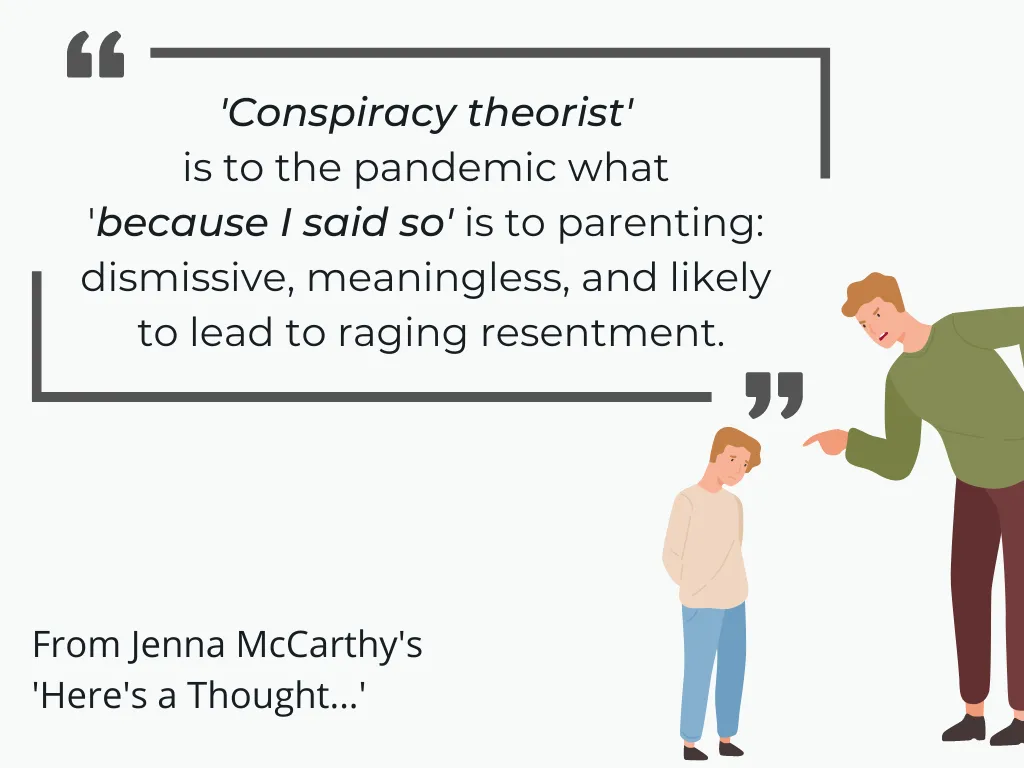By definition, a ‘conspiracy theorist’ is simply someone who suspects that someone else is doing something nefarious and then uses that suspicion to make subsequent life choices.

If I had a dime for every nasty name I’ve been called over the past three years, I’d be typing this from the back deck of my lavish, gently-used yacht. Pick your favorite pandemic topic — from the masks and PCR tests that never worked to the far-from-safe and not-even-remotely-effective vaccines — and I can rattle off hundreds of contemptuous comments and slanderous slurs I’ve endured for daring to openly dispute the carefully-constructed narrative being served up daily. The most popular putdown — and frankly the laziest — has to be conspiracy theorist.
[*Adjusts tinfoil hat and smiles broadly]
Conspiracy theorist is to the pandemic what because I said so is to parenting: dismissive, meaningless, and likely to lead to raging resentment. It’s the agenda follower’s best friend, though, because it requires no thoughtful discussion or constructive dialogue. “I refuse to even comment on your ridiculous conspiracy theories,” people have actually commented (the irony!) on my mask/mandate/vaccine injury posts.
Let’s take a quick moment to dissect the expression. By definition, a conspiracy is a secret plan by a group to do something unlawful or harmful. A theory is an idea used to explain a situation or to justify a course of action. Put the two together and a conspiracy theorist is simply someone who suspects that someone else is doing something dirty and then uses that suspicion to make subsequent life choices. Based on this simple, literal breakdown, if you have a hunch that your neighbor is a carjacker so you’re extra careful about locking your Subaru each night, you’re a conspiracy theorist. If you catch two co-workers tucking in their shirts as they stumble out of the supply closet together and you jump to the crazy conclusion that they weren’t in there stockpiling sticky notes, you should probably start shopping for your own tinfoil hat. If you collect mountains of proof that someone has been lying to you for months (well, pretty much forever, but let’s assume you’re new to espionage) so you refuse to let them jab you with an experimental drug cocktail with no safety record and for which they’re not liable if you drop dead or develop stiff-person syndrome, welcome to the nutter club.

Comedian Ron Funches has a bit on the subject that’s deservedly gone viral. “How do you not believe in any conspiracy theories?” Funches implores. “I understand not all of them, not most of them, but you don’t believe in any conspiracy theories? You just think the government’s batting 1,000 and telling us the whole truth?”
A beat. “That’s a strong stance to take.”
The guy’s got a solid point. If you’ve ever looked up “conspiracy theories that turned out to be true” on the good old interweb—you have, right?—you know what I’m talking about. From Operation Northwoods (oh, just the U.S. Department of Defense fabricating and staging acts of terrorism against Americans to justify invading Cuba) to MK-Ultra (a depraved CIA program that involved experimenting with mind control on unsuspecting subjects for decades), our distinguished “leaders” have engaged in some seriously nefarious pursuits over the years. And in nearly every instance, it was a solid generation before all the gory details were brought to light.
Man, I can’t wait for 2053!
Funnyman Funches continued, “I don’t like talking about politics on stage or offstage because I don’t like talking about things I don’t feel like I’m truly knowledgeable in, but I do know this: A government is placed in charge of all its people. I’m a father who’s been placed in charge of just one son. And I lie to that [kid] all the time!”
Gain of function research. Asymptomatic transmission. The lab leak theory. Vaccine passports. Exaggerated Covid case and death counts. Event 201. The fact that vaccines don’t stay in the arm but travel throughout the body and cross the placental barrier; the now-acknowledged cardiovascular and gynecological side-effects; the global spike in all-cause mortality since their rollout: All of these erstwhile “conspiracy theories” are now commonly accepted as fact—with shockingly little outrage from the folks who were duped, I might add.
At least—at last—the truth is trickling out. Of course, I wish it were faster, but I’ll take what I can get. And if you’re still inclined to consider me the crazy one here, ask yourself how sane it is to take health advice from career criminals, greasy-palmed politicians, witless talking heads, and a pudgy philanthropath obsessed with overpopulation. I’d say not very, but it’s just a theory.
Curiously, the definition of a mandate is “an authoritative command.” A law, on the other hand, is “any written or positive rule prescribed under the authority of [a] state or nation.” It’s essentially the difference between, “Hey, kid, get off my lawn,” and, “You’re under arrest for criminal trespassing.” There was no vaccine law, I’ll remind you. And yet students, pilots, travelers, teachers, frontline medical workers, and millions of employees from countless fields lined up for an experimental gene therapy injection because they were commanded authoritatively to do so.
Is anyone else as angry about this as I am?





